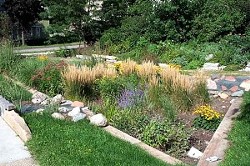Tuesday, July 13, 2010
News Tips to ease storm water problems at your house
Posted By Rhiannon Fionn-Bowman on Tue, Jul 13, 2010 at 10:37 AM
The Wall Street Journal has an online article that's quite timely for Charlotte, since every time it storms parts of the city flood. While I've been harping on this issue for a while, I thought you'd like to read what another writer has to say about the issue. Here's a snippet:
Cities are coming up with new ways to deal with an old problem: storm-water runoff.In the past, the solution was pretty straightforward. Cities would build and maintain drainage systems that could quickly collect storm water and transport it away from developed areas and into nearby rivers, lakes and streams. But with urban runoff increasingly being blamed for dirtying the nation's waters, the search is on for solutions that involve filtering or soaking up rainwater where it falls.
Thomas Ballestero, a civil-engineering professor at the University of New Hampshire, is the lead scientist at UNH Stormwater Center, which is exploring new methods for dealing with urban runoff. He says many developers and regulators aren't familiar with new technologies aimed at soaking up rainwater.
"People may not be up to speed," Mr. Ballestero says. "There is folklore that [these technologies] are either too expensive or they are impossible challenges."
Among the innovations his group is investigating is permeable pavement, which is made from material that allows water to flow through it and into the ground below.
And, as a refresher ... I know you know this already:
Runoff occurs when land is covered with buildings, streets and parking lots. Rainwater runs off these hard surfaces, picking up chemicals, sediment and other pollutants and sending them into local waterways. The rush of water from drainage pipes can cause erosion, and warmer runoff in the summer can change water temperature, hurting fish, plants and animals.
Read the entire article, by Willa Plank, here.
Some of the solutions are uber easy. I know, my husband and I are investigating solutions for our yard right now because we have a horrible storm water problem in our neighborhood and in our yard. Granted, it's not as bad as in other areas of the city.
Even though I'm on my 'hood's relatively powerless board of directors, I've decided I can't wait for the board's approval to take action when it comes to storm water ... not when the water gets so close to my back door.
I figure you don't want to wait on red tape to clear, either. So here are a few tips to ease the storm water issues in your area. And, by the way, even if your yard or neighborhood isn't flooding, you've got to consider the cumulative effects of everyone's storm water run off hitting the same creeks, streams, lakes and rivers. It's rough on nature's infrastructure, and things are wearing down. Why not give some of these options a try?
Tips to ease storm water run off at your house:
The first thing you should do is pay attention. The next time we have a big storm, take pictures of the water in your yard and where it's coming from. This will you help you decide what kind of effort to make to curb storm water run off on your property.
Is storm water puddling on your roof or around the base of your house? Check your gutters. Make sure they're debris-free. Also make sure you know where the downspouts are and how they're draining. You can buy bags of small gravel at garden centers to pour around the end of the down spout. This will help prevent erosion around the base of your house and will help you direct the flow of water.
Speaking of water flow, how about planting a rain garden? Plants are well-known water lovers. The more trees, shrubs and other plants you have on your property, the more likely they'll suck up storm water before it runs into the drain. Bonus: Some plants also suck up pollutants. The first quarter-inch of rainfall is the most polluted, that's usually where you'll find the bulk of the fertilizers, oil and other crud that's on the surface of our world.
Rain gardens are simply areas where you install plants that really love water. You want it to be a little lower than the rest of your property, since water and gravity are such good buds. You can direct rainwater from your downspouts, and even the overflow from your rain barrels, into the gardens. They'll love you for it.
Speaking of rain barrels, get one. The county sells them here. I've also seen them at other stores, in different sizes and prices. They are not cheap, but they are effective and, especially if you've got plants to water, they can save you money over time. While a 96-gallon barrel sounds big, one rain storm can fill it. On the bright side, that's 96 gallons that didn't rush into the river.
Remember: one inch of rain on one square foot of roof area produces 0.52 gallons of water. Multiply that number by the size of your roof to help you determine what size of a rain barrel to purchase, and how many you should purchase. (If you figure out you need more than one, don't feel like you have to buy them all at once. One will make a difference.)
If you're feeling ambitious, and we are, look into cisterns. I've heard tale of folks repurposing old appliances, like washing machines, into cisterns. Essentially, you bury them in your yard, direct the rain water into them, install a pump and ... magic... you have rain water you can later use to water the plants in your yard. It can be difficult to determine what size cistern your yard needs, but plan big to be on the safe side.
Any of these suggestions will help you be part of the storm water solution — and boy does Charlotte need one. The real bonus, though, is that if the area dips into a drought again your yard won't notice since you'll be watering every thing in it from the rain you collected. Bravo!
Here's more about harvesting rain for your garden:
Speaking of...
Latest in The CLog
More by Rhiannon Fionn-Bowman
-
Cancer's better with a side of 'shrooms
Aug 7, 2020 -

The Last Mountain will move viewers
Aug 4, 2011 -
Government's mixed message for women
Aug 2, 2011 - More »









